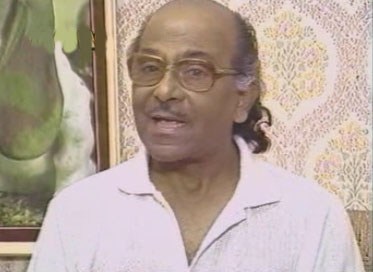| articles Few Moments with Salil Chowdhury Kalpana Biswas ....continued from Page 2
K.B: It's rather regrettable about our generation when we think that although so many talented people got together [in IPTA], but at the end the whole thing turned into a petty affair. S.C: It was bound to happen for they belonged to the petty bourgeois class. I personally believe that our leadership was responsible for the break up. We sought conscious political and cultural leadership from our leaders. But the Communist Party never succeeded in providing a cultural leadership in a meaningful way. K.B: On the one hand the leaders would give you a free reign to what you are performing, on the other hand there was this coercion, that they wouldn't allow a song to be performed publicly unless it carried a certain sentiments approved by the party. Don't you think this two kind of attitudes were contradictory? S.C: This happened in a particular period. Immediately after that period I left IPTA, and came to Bombay in 1953. My coming to Bombay and joining the film industry had an adverse reaction among some so-called progressive individuals. They thought of anyone joining the movie industry as a sign of loosening of morals. These beliefs are still there. These people still do not understand what an immensely powerful medium of communication film is, which has the ability to move the audiences unlike any other medium. But they still think of us as untouchables. Because we are making money in the movie industry, we have composed songs for the movies. Therefore we have lowered ourselves in their eyes. But those who never got the opportunity to make it big, are the ones who started such a notion. Even today those people are holding on to their ‘holier than thou' attitude. However, they do not have any contribution worth a penny either in culture or in politics. K.B: Can we then say that those who joined the IPTA at the time were divided in two camps? While people in one camp came with a progressive political outlook, the other came just to exploit the platform for their own self-interests? S.C: No. I don't think this is the right way to describe the situation. I don't agree that some people used IPTA platform for their own benefits, although that may have happened towards the end. But initially there was a tremendous upsurge along with the right kind of leadership. It took place after the Bengal Famine was over, and mostly the politically conscious artists were the ones who gave leadership to this upsurge. Most of those artists belonged to the Communist Party. Through their leadership they brought many like-minded people on to the platform. That is a fact. It was not like as if we tried to use a cultural platform for the political purpose. It was so spontaneous. K.B: Would you say that the plays and the songs written and performed at the time were about anti-exploitation? S.C: Yes they were. They were about anti-exploiters, anti-British, for independence, etc. It covered a whole range of things. K.B: But what about the rational analysis of class structure, the basic premise of Communism? Was that reflected in those plays and songs? S.C: There were quite a few plays along that line. "Nabanna" is a glaring example where the class structure of the contemporary society was described in full. Starting with the farming class to the middlemen to the landowners and finally to the upper class elite of the city, the play delineated all these classes quite effectively. K.B: That may be true, but we have seen that such attempts to describe the class structure end up in some kind of black-and-white simplistic description of the society. Do you think such attempts can really be effective in any way? What is the long-term effect of such a movement that was a source of momentary emotional agitation? S.C: That needs to be seen. Critics will judge the effect of our movement. When an art form has served its purpose then what lasts after the need is gone depends on the basic quality of that art form that was used to agitate the people. What dramatic value ‘Nabanna' has retained today after it has served its purpose, or how effective Bijan Bhattacharya is in the art of writing plays, that needs to be judged by you people, the critics. But it has served a tremendous purpose and it did the job. But to see it analytically whether it did certain things right or not, that's beside the point. K.B: Did you travel a lot in the rural areas taking the play? S.C: A lot. Bijan-da wrote another play, called "Jabanbandi" ["The Testimony"]. I was not part of the dramatic group. Although I had written quite a few plays myself. One of those plays, titled, "Janantike" ["Thinking Aloud"] became quite popular. Then I wrote another play, called, "Ei Maati-te" [On This Earth"]. I wrote them all for the IPTA. Unfortunately all those plays are lost now. The manuscripts of those plays are all lost, and I do not have the copies either. Once I adapted the play "The Rising of the Moon", and called it "Arunodayer Pathe" ["Way to the Rising Sun"]. This one got published and hence survived. No other manuscripts of the plays written during those years are with me. |

